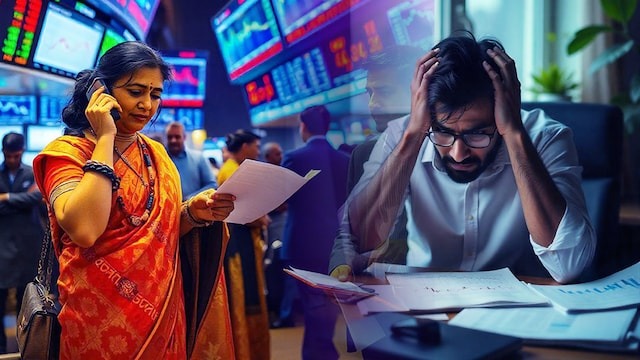
The market continues to fall. Sensex and Nifty fell for the fifth consecutive session amid FII selling, poor second quarter results and global uncertainties. This fall in the market has created an atmosphere of fear among the people. People's returns are declining. However, market experts say that there is no need to fear this fall in the market because the market has gone through many big accidents before.
The stock market keeps fluctuating. There have been many occasions in the past when the market witnessed a big decline. Due to these declines, investors have suffered losses in a short time. Usually, a decline in the stock market is defined as a sharp two-digit drop in the index. Although the markets have always recovered, but sometimes, the impact of the decline lasts for years.
The market gave returns Even after many major accidents, Nifty has given a CAGR return of 16 percent in the last 20 years. Sensex has given a CAGR return of 16 percent. Midcap CAGR return has been 17 percent and Smallcap CAGR return has been 18 percent. These accidents include Israel-Hamas in 2023, Ukraine-Russia war, Kovid epidemic in 2020, NDA's second term in 2019, implementation of GST in 2017, demonetization and many other incidents, whose effect was seen on the stock market. Nifty CAGR: +16% Sensex CAGR: +16% Midcap CAGR: +17% Smallcap CAGR: +18% Financial Crisis of 2008 The financial crisis of 2008 adversely affected businesses, the economy and the stock markets. On 21 January 2008, the Sensex fell by around 1408 points, leading to a major drop in investor wealth. This day is known as Black Monday and analysts have attributed the fall to a number of factors, including a change in global investor confidence, widespread fear of a slowdown in the US economy, falling interest rates in the US, volatility in commodity markets. By the end of 2008, the Sensex had fallen from around 20,465 points to 9716 points. In September 2010, the Sensex finally crossed the 20,000 mark again. Demonetization 2016 2015-16 was a difficult period for stock markets around the world. The Sensex in India continued to decline. By February 2016, it had fallen by about 26 percent in just 11 months. The main reason for this was the very high NPA of Indian banks and global weakness. By November 2016, after the government cracked down on black money through demonetization, people sold wildly, due to which the Sensex fell by 6 percent. Along with this, other Asian markets also saw a decline. Covid Pandemic In 2020, the outbreak of the Covid-19 pandemic led to a worldwide lockdown and a massive decline in global and Indian markets. Within a week of the day the World Health Organization (WHO) declared the virus a pandemic, the Sensex fell from 42,273 points to 28,288 points. Israel-Hamas War in 2023 The Israel-Hamas War in 2023 led to a major decline in the stock markets. The incident has increased geopolitical tensions, as well as a surge in crude oil prices and volatility in global stock markets. 1993 Bombay Blasts The 1993 Bombay bombings did not directly affect the market share of the Bombay Stock Exchange (BSE), but the National Stock Exchange (NSE) as well as the BSE were closed on the day of the attacks. Kargil War
Read More: Ola founder Bhavish Aggarwal gets relief from Bombay High Court, will not be arrested; stock returns
--Advertisement--

 Share
Share



